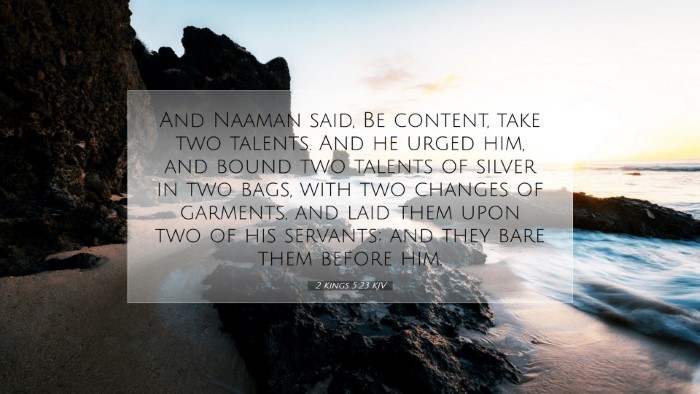Commentary on 2 Kings 5:23
Verse Context: 2 Kings 5:23 records a significant event in the narrative of Naaman, the Syrian general who was healed of leprosy by the prophet Elisha. This verse occurs after Naaman's healing and his decision to offer gifts to Elisha, which the prophet refuses. Here, Gehazi, Elisha's servant, seeks to gain wealth deceitfully. The verse states:
"But Gehazi, the servant of Elisha the man of God, said, Behold, my master hath spared Naaman this Syrian, in not receiving at his hands that which he brought: but, as the Lord liveth, I will run after him, and take somewhat of him."
Insights from Commentaries
Matthew Henry's Commentary
Matthew Henry provides a rich exploration of the spiritual and moral implications surrounding Gehazi’s actions. Gehazi’s desire to pursue Naaman for gifts reflects a deeper greed and a lack of spiritual discernment. Henry emphasizes how Gehazi misinterpreted Elisha's refusal to accept gifts as a missed opportunity for personal gain. This moment serves as a crucial reminder that one can be close to the things of God and still fall prey to materialistic temptations.
Albert Barnes' Commentary
Albert Barnes sheds light on the character of Gehazi, contrasting it with that of his master, Elisha. Barnes notes that Gehazi's actions revealed a heart filled with avarice and a lack of integrity. He posits that Gehazi's decision to pursue Naaman was driven by the desire for wealth rather than a pure motive to help. Barnes warns that the pursuit of material gain, especially at the expense of divine principles, can lead one away from God’s perfect will. Gehazi’s story is a solemn caution for all in ministry about the perils of succumbing to greed.
Adam Clarke’s Commentary
Adam Clarke delves into the cultural context of Naaman’s gifts and Elisha’s refusal. Clarke points out that in ancient times, gifts were often seen as acknowledgments of favor. He explains that Elisha’s refusal to accept gifts from Naaman was emblematic of his prophetic role and fidelity to God’s command. Clarke’s insights highlight that Gehazi's desire for the gifts betrayed a lack of understanding and reverence for the nature of prophetic ministry. He underscores the point that true service to God should not be mingled with worldly expectations of compensation.
Reflection on Spiritual Lessons
This verse invites reflection on several key themes relevant to the life of faith:
- The Danger of Greed: Gehazi’s immediate decision to chase after Naaman serves as a warning against letting earthly desires overshadow spiritual integrity. His actions demonstrate how greed can distort our understanding of God’s work.
- The Importance of Integrity: Elisha’s refusal of the gifts underlines a profound integrity and obedience to God’s will. Church leaders and ministers are called to uphold such integrity in their dealings, always testing their motives against Scripture.
- The Consequences of Deception: Gehazi's subsequent lies lead to severe consequences, which illustrates that deception, even in subtle forms, can lead one down a destructive path. This warns against the temptation to justify unethical behavior in pursuit of personal gain.
- Divine Provision: Elisha’s reliance on God instead of the gifts from Naaman serves as an example of trust in divine provision rather than worldly treasure. Believers are encouraged to seek God’s kingdom first, knowing that all other needs will be met by Him.
Conclusion
2 Kings 5:23 encapsulates a pivotal moment that is rich with theological and ethical insights. From the perspectives of Matthew Henry, Albert Barnes, and Adam Clarke, Gehazi’s pursuit of wealth at the expense of spiritual integrity stands as a cautionary tale for all believers, particularly those in leadership. It calls for an earnest examination of personal motives, an adherence to the principles of integrity, and a commitment to living out a faith that transcends material desires. In these reflections, we find a compelling reminder to prioritize our relationship with God and to trust Him wholly for our provision.


